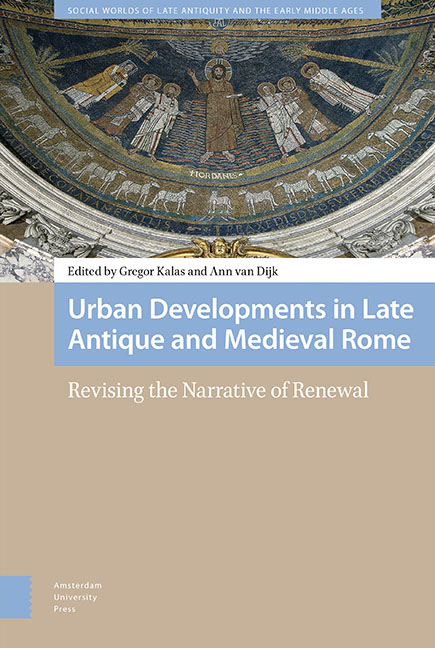Book contents
- Frontmatter
- Contents
- Preface and Acknowledgments
- List of Abbreviations
- 1 Introduction: Revising the Narrative of Renewal for Late Antique and Medieval Rome
- 2 Rome at War: The Effects of Crisis on Church and Community in Late Antiquity
- 3 Portraits of Poets and the Lecture Halls in the Forum of Trajan : Masking Cultural Tensions in Late Antique Rome
- 4 Rolling Out the Red Carpet, Roman-Style : The Arrival at Rome From Constantine to Charlemagne
- 5 (Re-)Founding Christian Rome: The Honorian Project of the Early Seventh Century
- 6 After Antiquity: Renewing the Past or Celebrating the Present? Early Medieval Apse Mosaics in Rome
- 7 The Re-Invention of Rome in the Early Middle Ages
- 8 Rewriting the Renouveau
- 9 Renewal, Heritage, and Exchange in Eleventh-Century Roman Chant Traditions
- 10 Reforming Readers, Reforming Texts: The Making of Discursive Community in Gregorian Rome
- Manuscripts Cited
- Index
5 - (Re-)Founding Christian Rome: The Honorian Project of the Early Seventh Century
Published online by Cambridge University Press: 18 June 2021
- Frontmatter
- Contents
- Preface and Acknowledgments
- List of Abbreviations
- 1 Introduction: Revising the Narrative of Renewal for Late Antique and Medieval Rome
- 2 Rome at War: The Effects of Crisis on Church and Community in Late Antiquity
- 3 Portraits of Poets and the Lecture Halls in the Forum of Trajan : Masking Cultural Tensions in Late Antique Rome
- 4 Rolling Out the Red Carpet, Roman-Style : The Arrival at Rome From Constantine to Charlemagne
- 5 (Re-)Founding Christian Rome: The Honorian Project of the Early Seventh Century
- 6 After Antiquity: Renewing the Past or Celebrating the Present? Early Medieval Apse Mosaics in Rome
- 7 The Re-Invention of Rome in the Early Middle Ages
- 8 Rewriting the Renouveau
- 9 Renewal, Heritage, and Exchange in Eleventh-Century Roman Chant Traditions
- 10 Reforming Readers, Reforming Texts: The Making of Discursive Community in Gregorian Rome
- Manuscripts Cited
- Index
Summary
Abstract
Honorius I (625–38) became pope at an opportune moment of relative peace and stability in Italy. His energetic building program and revitalization of the ecclesiastical carmen epigraphicum index his intention to re-found Christian Rome after the difficulties of the war-torn and plagueridden sixth century. His program was not only sensitive to inherited forms of papal patronage and popular piety, but distinctly capitalized, in new ways, upon Rome's growing reputation as the city of martyrs par excellence. Hence it is reasonable to consider Honorius's pontificate as a pivotal moment in the transition from late ancient to early medieval Rome and to offer it a place in any new narrative of renewal in Roman urban history.
Keywords: Pope Honorius I, S. Agnese fuori le mura, carmen epigraphicum, Old St. Peter’s
Honorius I was elevated to the papacy in October 625. In the preceding two decades, following the death of Gregory I in 604, five different men had held the Roman episcopacy. Honorius would serve as the city's bishop for twelve years and eleven months, until October 638, a tenure only seven months short of Gregory’s. For the remainder of the seventh century, only two men surpassed his nearly thirteen years on the papal cathedra (and then just barely). In Honorius's case, time mattered. He inherited a city diminished and in tatters, one that, even now, despite recent re-thinking and new information, remains hard to visualize amid an age so long (considered) ‘dark’. Yet, it is just possible – on the basis of contemporary documentary, epigraphic, literary, and art historical evidence – to see Honorius's episcopacy as a period that laid the foundations for a new instantiation of Christian Rome, one whose Janus-like image not only looked back to the city's fifthcentury heyday of church building and papal imagineering, but also solidified Rome's status as the medieval West's ‘city of saints’ par excellence. If ‘renaissance’ is understood to denote a particularly self-conscious moment of ‘self-reinvention’ through the assimilation and creative transformation of the past – and not simply a movement in which ancient texts and literary forms are recuperated – then Honorian Rome may merit consideration as home to yet another renaissance in a city that, perhaps more than most, had long been deeply committed to curating its past for present purposes.
- Type
- Chapter
- Information
- Urban Developments in Late Antique and Medieval RomeRevising the Narrative of Renewal, pp. 149 - 176Publisher: Amsterdam University PressPrint publication year: 2021



